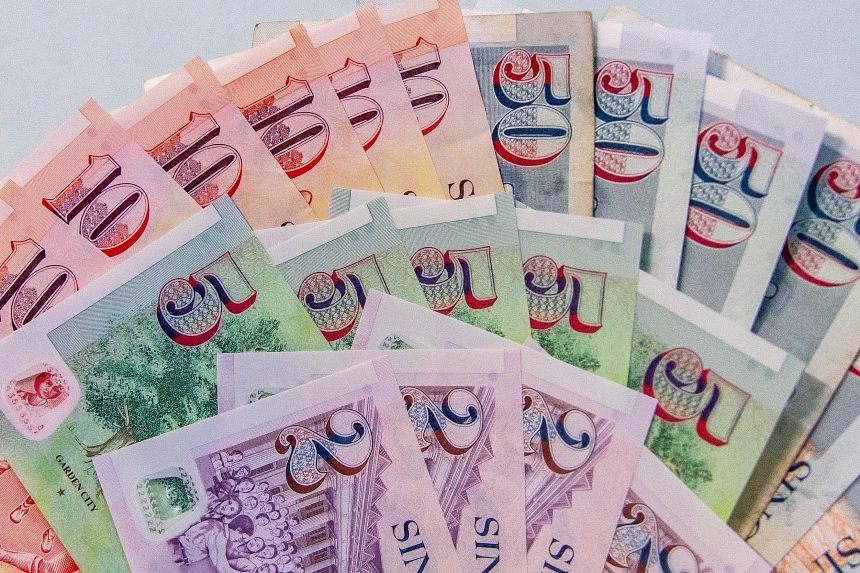T-bills continue to be a safe harbour for risk-averse investors even as yields fall below 3%

SINGAPORE – Yields continue to fall for six-month Treasury bills (T-bills), with the level at the Sept 26 auction going below 3 per cent for the first time since September 2022.
Investors will get a return of 2.97 per cent, down 0.13 percentage point from the 3.1 per cent recorded in the Sept 12 auction.
The auction came just days after the US Federal Reserve cut interest rates by a bigger-than-expected 50 basis points to a range of 4.75 per cent to 5 per cent.
The Sept 26 auction attracted applications amounting to $13.9 billion for the $6.8 billion on offer, just ahead of the $13.4 billion worth of applications at the previous auction.
Mr Wong Di Ming, research analyst in the bond research team at Bondsupermart, said the yields on six-month T-bills dropped significantly in two of the three auctions in August, ahead of the US Fed meeting on Sept 18.
Yields at the Aug 1 auction came in at 3.4 per cent, down 0.24 percentage point from the 3.64 per cent recorded in the July 18 auction.
It was more of the same on Aug 29 with yields at 3.13 per cent, down 0.21 percentage point from 3.34 per cent on Aug 15.
Mr Wong said yields are likely to continue falling if the Fed cuts rates further.
“With policy rates falling, it would be inevitable for short-end rates to begin falling, especially given that Singapore is an interest-rate taker and heavily influenced by US interest rates,” he added.
The US central bank will make its next announcement on Nov 8, but has reiterated that any further adjustments to interest rates will depend on economic data and the risks to growth.
Mr Gerald Wong, chief executive of investment advisory platform Beansprout, noted that the rate cut on Sept 18 was driven by weaker inflation and signs of softening in the US labour market.
He said he would look out for these factors in the lead-up to the next meeting.
The falling T-bill rates have not deterred investors.
Housewife Michelle Goh, 57, has been buying these short-term government securities since yields started creeping above 2 per cent in June 2022, and continues to do so.
But with most of her money tied up now, she has not much spare cash left, so Madam Goh applied for only $5,000 worth of T-bills in the Sept 26 auction.
Portfolio manager Daryl Liew, 50, did not apply for the Sept 26 auction, but he has T-bills in his own portfolio. Mr Liew said the money could be used to service the loan of the Tesla he bought a month ago.
There will be six more six-month T-bill auctions – Oct 10, Oct 24, Nov 7, Nov 21, Dec 5 and Dec 19 – in 2024, and a one-year T-bill auction on Oct 17.
Beansprout’s Mr Wong said T-bills remain a place to park some cash, especially for risk-averse investors, because they are guaranteed by the Singapore Government and so are risk-free.
The short maturity period of six months to a year means investors can get back their cash within a short period, making T-bills more liquid compared with other investments that have a longer time to maturity.
Investors can either place a non-competitive bid or a competitive one. A non-competitive bid involves an investor specifying only the amount he wants to invest, not the yield. He will then be allocated T-bills at the cut-off yield.
In the Sept 26 auction, non-competitive bids totalled $1.5 billion, and all bidders had their full allotment at the cut-off yield of 2.97 per cent.
Madam Goh and Mr Liew always lodge non-competitive bids.
Madam Goh said she is content to earn some extra interest above the savings account rate of 0.05 per cent.
Mr Liew is not worried that the yield he gets is too low, as he believes the opportunity cost of missing out on a T-bill issue is greater.
Beansprout’s Mr Wong said other investors could consider putting in competitive bids to ensure they get at least their minimum desired return.
He said they could look at the alternative investments they have and how much these investments will yield them in order to come up with a bid to submit.
For example, if they can find a six-month fixed deposit paying 3.2 per cent, they could put in a competitive bid of 3.2 per cent.
This ensures they will get a yield of 3.2 per cent or higher on the T-bills or, if they fail to get any T-bills, they can still place their money in that six-month fixed deposit to earn 3.2 per cent.
About 95 per cent of competitive applications were allotted at the cut-off yield of 2.97 per cent in the Sept 26 auction.
Beansprout is advising investors to consider other safe options to lock in yields before interest rates fall further, such as Singapore Savings Bonds (SSBs).
Applications for the October tranche of SSBs closed on Sept 25, but the November issue opens for applications on Oct 1.
SSBs allow an investor to secure their interest rates for the following 10 years. They also have the flexibility to redeem their bonds at any time if interest rates go up subsequently.
So they could redeem their current tranche of SSBs and place the money in the next issue, if it offers a higher return, Beansprout’s Mr Wong said.
“That is a strategy that some investors can consider that is, I would say, fairly simple, and allows you the ability to lock in interest rates over an extended period of time. Effectively, you have the ability to lock in but still keep your flexibility (to get out).”
Join ST's Telegram channel and get the latest breaking news delivered to you.






No comments:
Post a Comment